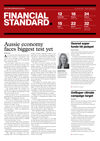Future Super measures environmental impact of portfolioBY RACHEL ALEMBAKIS | FRIDAY, 26 JUN 2020 10:10AMFuture Super has released its second impact report, measuring the fund's environmental impact both in terms of fossil fuel investments avoided and renewable energy that investments have generated. |
Editor's Choice
AGL mulls sale of Tilt Renewables
AGL Energy has confirmed it is considering selling its 20% stake in the wind and solar energy generator.
Nuveen eyes green loans in local RE strategy
Following its first close in December, Nuveen's Australian commercial real estate debt strategy, which has a focus on responsible investing, has received $300 million from the Canadian Pension Plan Investment Board (CPP Investments) on its second close.
Wollemi Capital buys renewables platform
The climate-focused investment firm will pay $19 million for MPower Group's renewable energy and battery storage business after the latter faced challenges in securing funding.
Podcast: Measuring nature assets in portfolios
In this episode of The Greener Way, host Michelle Baltazar discusses the transition to nature-positive investment portfolios with Lucian Peppelenbos, climate and biodiversity strategist at Robeco.



















"According to recent research from Rainmaker Information ... if a superannuation fund member invested in general balanced or growth super fund options they would have been 1.5% better off over the 12-months to end March if they chose ESG balanced or growth options."
Is there a link to the research? Does this apply to Future Super's options or to some general ESG classification of investment components and therefore also to other super funds that offer ethical and sustainable social impact investment?
Hi Professor Davos,
The research is derived from Rainmaker Information, the parent company to this publication. It refers to a general balanced or growth super fund option compared to a general ESG balanced or growth option (not just Future Super).